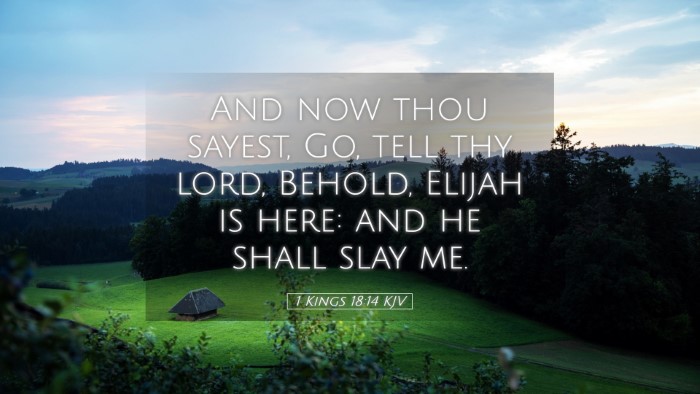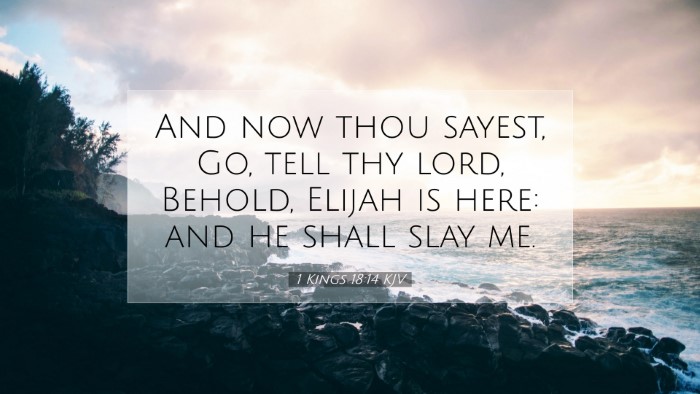Commentary on 1 Kings 18:14
Verse Reference: 1 Kings 18:14 - "And now you say, 'Go, tell your master, 'Elijah is here.' He will kill me!"
Contextual Overview
This verse is set against the backdrop of the confrontation between the prophet Elijah and the prophets of Baal, amidst a severe drought in Israel. The tension escalates as Elijah seeks to reveal the futility of idol worship and return the people to the Lord. The historical context plays a significant role in understanding the spiritual stakes involved.
Exegesis and Analysis
Influence of Fear: In this verse, the character Obadiah, a servant of King Ahab, is expressing deep trepidation regarding Elijah's request to confront Ahab. The fear of death signifies the intense conflict between the prophets of the Lord and the ruling authority that has embraced Baal worship.
The Prophetic Ministry: Elijah's role as a prophet exemplifies the essential function of messengers of God – to confront powers and systems that oppose divine will. Obadiah's fear highlights the tension faced by believers when called to act against worldly pressures and expectations.
Commentary Insights
- Matthew Henry: Henry emphasizes the courageous stand of Elijah against the deep-rooted idolatry of Israel. He reflects on the challenge faced by the prophets in providing truth in a land that had succumbed to lies. His analytical approach shows how Obadiah's fear is rational, given the volatile political climate.
- Albert Barnes: Barnes provides a detailed breakdown, focusing on Obadiah's loyalty to God while serving a wicked king. He notes that this dichotomy illustrates the complexities of faith within compromising environments. Barnes articulates that Obadiah's fear is also a recognition of Ahab's violent tendencies, highlighting the perilous nature of prophecy.
- Adam Clarke: Clarke takes a pastoral approach, examining the emotional and spiritual turmoil inherent in the prophetic vocation. He points out that Obadiah had preserved a remnant of God's people, hidden from persecution, which enriches our understanding of community and faith in adversity. He calls attention to the internal struggle many believers face when obeying God's calling amidst fear.
Theological Implications
This encounter illustrates several key theological themes:
- The Call to Faithfulness: Even in the face of personal peril, God's prophets are called to reveal His truth. This affirms the unwavering commitment required in the life of faith.
- The Nature of God’s Protection: Obadiah's fear serves as a reminder of the potential for danger in pursuing God’s mandates. Yet, it also reflects a belief in divine sovereignty amidst adversity.
- The Dynamics of Power: This passage emphasizes the struggles within systems of power when confronted with divine authority. The believer’s stand may provoke conflict but is essential to bring about spiritual renewal within a society.
Practical Applications
For pastors and theologians, 1 Kings 18:14 serves as a compelling text for preaching and teaching about the courage required in faith. Below are some applicable lessons:
- Courage in Leadership: Leaders are called to make difficult decisions that require steadfastness in the face of opposition.
- Encouragement for the Fearful: This text reflects the reality of fear in ministry. Pastors can draw from this to offer compassion and support to those struggling with their faith or calling.
- Call to Righteousness: Encouraging congregations to confront societal norms that oppose God's will is integral to a faithful ministry.
Conclusion
1 Kings 18:14 embodies the tension between divine calling and human fear. Through the perspectives of various commentators, we gain a multi-faceted understanding of Obadiah's situation and the broader prophetic narrative. This verse invites deep reflection on our own responses to God’s calls amid adversity, reminding us of the continuous need for faithfulness, courage, and reliance on God’s guidance.


